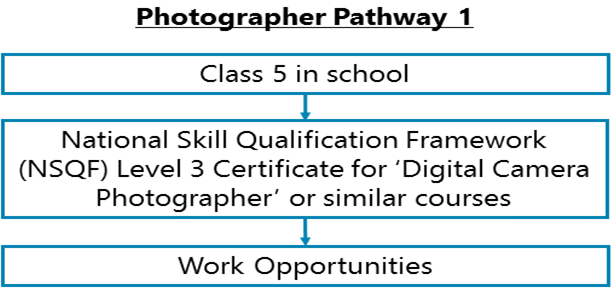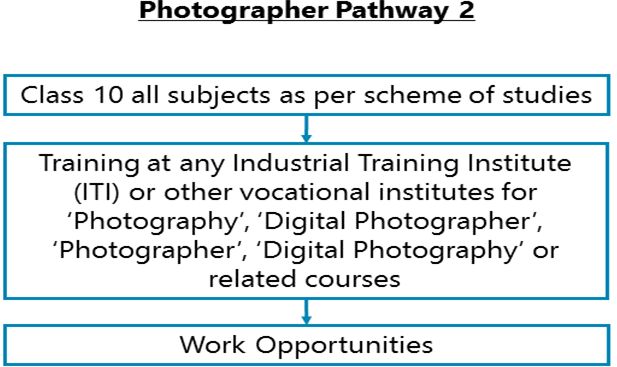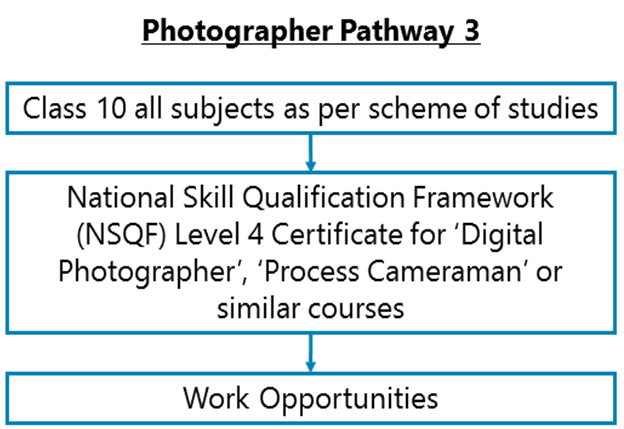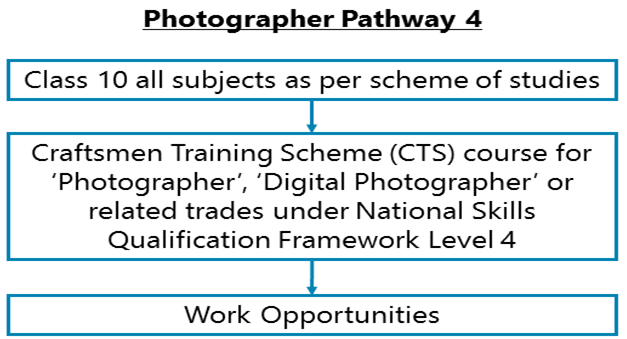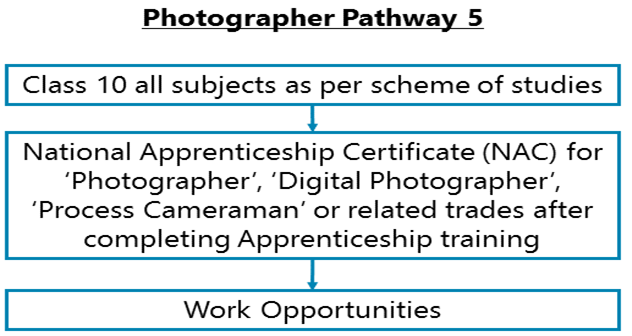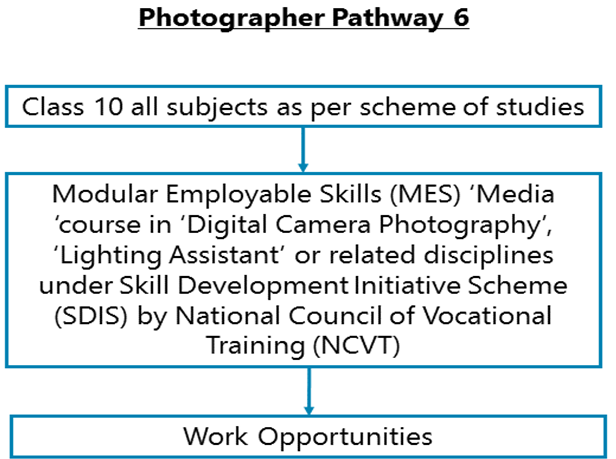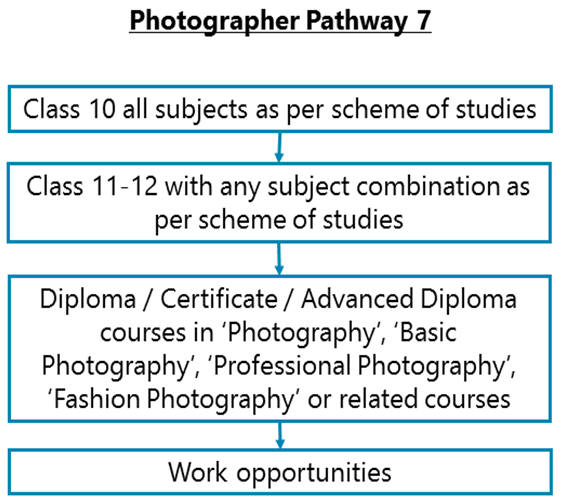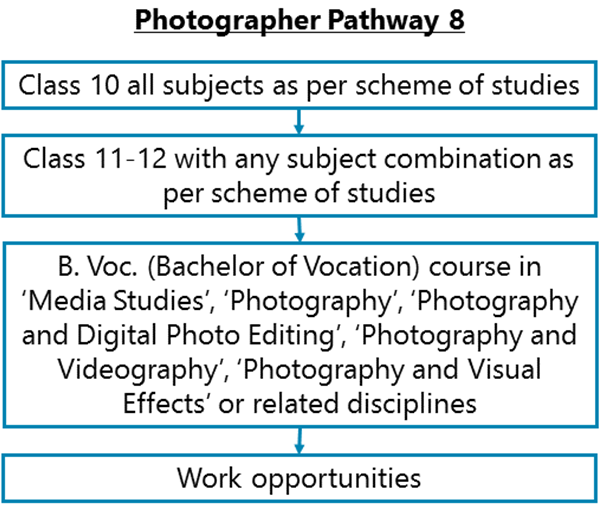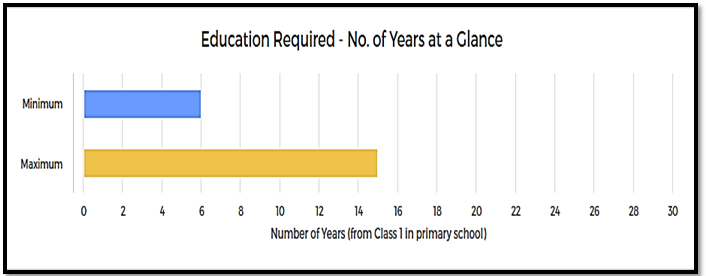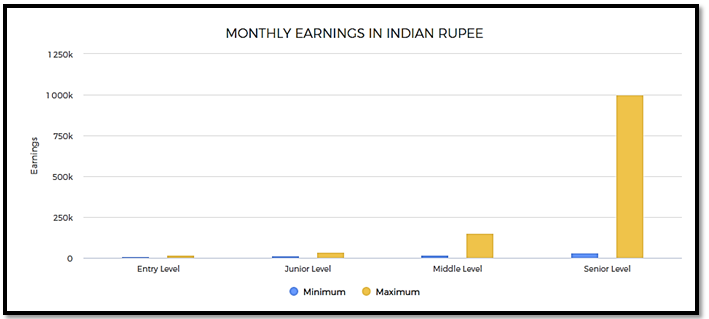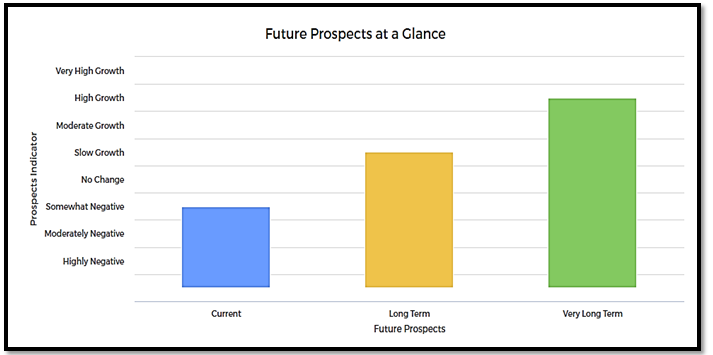Photographer (Vocational)
Entry Level Qualification
10
Career Fields
Mass Media, Journalism & Entertainment
For Specially Abled






Career Entrance Exam
About Career
1. As a Photographer, you can pursue your career in various segments like photojournalism, portrait photography, wedding photography, landscape photography, forensic photography, real estate photography, sports photography, travel photography, wildlife photography, food photography, or freelance photography.
2. Photography is critical to a broad range of industries from fashion to food to real estate to news & entertainment to science & engineering and others. In this field, you will find many working as freelancers and selling their shots/images as stock photos or to different corporate houses requiring their services.
3. You may be using traditional photographic equipment or modern imaging technology at work. There is a multitude of varied career choices in this field today. Each choice comes with the demand for different skill sets and offers separate opportunities but the one common factor is love for the lens.
4. Photojournalism is a branch of journalism that involves capturing news stories in the form of pictures/images. Wedding photography is a very lucrative business to get into. You can start as an assistant to professional wedding photographers in their studios and then form your business unit focusing on weddings. Portrait photography is for a single person or a group of people who may be to capture a variety of moments or situations.
5. As a landscape/travel photographer, you have to travel to separate locations to document images of natural spaces, man-made monuments, etc. You may be working with travel magazines, and media houses or selling your shots/images as stock photos or to different publications. Forensic photography involves working with crime investigation or police departments to document crime scenes or forensic photos.
6. Food photography is an emerging field. As a Food Photographer, you may work with food blogs or magazines or as a food blogger to take pictures in a unique style. As a real estate photographer, you will mainly be capturing commercial properties for property agents to shoot their on-sale properties or sell your own services as a freelancer.
7. As a Wildlife Photographer, you may sell your shots of plants, animals or nature to different publications. You may also work as a camera operator/cameraman in film and television shooting sets. For any type of photography, you need to be able to create visual interest for your target audience and remember the ‘rule of thirds’ (every image should be divided into 9 blocks with two vertical and two horizontal lines, and every essential element in the picture should be positioned along these lines or at their intersection points).
PARTICULARS | DESCRIPTION |
Name | Photographer (Vocational) |
Purpose | Capturing News Stories |
Career Field | Mass Media, Journalism & Entertainment |
Required Entrance Exam | No Entrance Exam |
Average Salary | 1,00,000 - 3,00,000 Rs. Per Year |
Companies For You | Television Companies, Book publishers, Websites & Many More |
Who is Eligible | Any One |
Key Roles and Responsibilities:
As a Photographer, you will be engaged with one or more of the following roles and responsibilities:
1. You will be photographing people, merchandise, landscapes, or other subjects, using digital or film cameras and devices.
2. You may be developing negatives or using computer software to produce finished prints and images. You will be using traditional or digital cameras and a variety of other instruments like filters, tripods, and flash attachments.
3. You will be determining the desired composition of the images and pictures, adjusting and selecting equipment, subjects, and lighting to get the desired effects.
4. You will be adjusting shutter speeds, apertures, and camera focus according to various factors like field depth, lighting, film type, subject motion, and film speed.
5. You may be manipulating and enhancing digital or scanned images for creating desired effects, using specialized software or computers.
6. You may have to determine project goals, equipment needs, and locations by studying assignments and consulting with advertising staff or clients.
7. You may have to produce digital, computer-readable images from the film, using photofinishing laboratories and flatbed scanners.
8. You will be developing and printing exposed films, using touch-up tools, chemicals, printing and developing equipment etc.
9. You may be employing various specialized photographic techniques and materials, including ultraviolet and infrared films, photogrammetry, macro photography, and sensitometry.
10. You may have to create captions accompanying a photo shot (maybe a title, location, and date) to help a viewer understand the context of a picture better. An effective caption describes what is not visible in the photograph and must not repeat what is already shown.
Career Entry Pathway
Class 5 in school - NSQF Level 3 Certificate for ‘Digital Camera Photographer’ or similar courses
After completing Class 5 in school, you can go for National Skill Qualification Framework (NSQF) Level 3 Certificate for ‘Digital Camera Photographer’ or similar courses. The total number of training hours is 90.
Class 10 all subjects as per scheme of studies – training at an ITI or similar institution for ‘Photography’ or similar courses
After Class 10, you can go for training at any Industrial Training Institute (ITI), National Skill Training Institute (NSTI), Regional Vocational Training Institute (RVTI), National Vocational Training Institute (NVTI), Industrial Training Center (ITC), Workshop Training Institute (WTI) or other vocational institutes for ‘Photography’, ‘Digital Photographer’, ‘Photographer’, ‘Digital Photography’ or related courses. These are 2-year courses. You will sit for All India Trade Test (AITT) to get a National Trade Certificate (NTC) after this course. This exam is held twice a year in the months of February and July.
Class 10 all subjects as per scheme of studies - NSQF Level 4 Certificate for ‘Digital Photographer’, ‘Process Cameraman’ or similar courses
After Class 10, you can go for National Skill Qualification Framework (NSQF) Level 4 Certificate for ‘Digital Photographer’, ‘Process Cameraman’ or similar courses. The total number of training hours will be 2080.
Class 10 all subjects as per scheme of studies – CTS NSQF Level 4 Training for ‘Photographer’, ‘Digital Photographer’ or related trades
After Class 10, you can go for the Craftsmen Training Scheme (CTS) course for ‘Photographer’, ‘Digital Photographer’ or related trades under the National Skills Qualification Framework Level 4. This is a 1-year course with 2 semesters of 6 months each.
Class 10 all subjects as per scheme of studies – obtain National Apprenticeship Certificate in ‘Photographer’, ‘Digital Photographer’, ‘Process Cameraman’ or related trades
After Class 10, you can obtain National Apprenticeship Certificate (NAC) for ‘Photographer’, ‘Digital Photographer’, ‘Process Cameraman’ or related trades after completing Apprenticeship training. Apprenticeship training duration will range from 1 year 6 months to3 years.
Class 10 all subjects as per scheme of studies – MES course in ‘Digital Camera Photography’ or related disciplines
After Class 10, you can go for a Modular Employable Skills (MES) ‘Media ‘course in ‘Digital Camera Photography’, ‘Lighting Assistant’ or related disciplines under Skill Development Initiative Scheme (SDIS) by National Council of Vocational Training (NCVT). The number of training hours ranges between 90 and 450.
Class 10 all subjects as per scheme of studies – Class 11-12 with any subject combination as per scheme of studies - Diploma / Certificate / Advanced Diploma coursesin ‘Photography’ or related courses
After Class 11-12, you can go for Diploma / Certificate / Advanced Diploma courses in ‘Photography’, ‘Basic Photography’, ‘Professional Photography’, ‘Fashion Photography’ or related courses. There are various institutes which offer these courses in distance learning mode too meaning you do not have to go to the Institute for classes other than for practical training (whenever applicable). However, there are other institutes which provide coaching in the regular mode where you have to visit the Institute for taking the classes.
Class 10 all subjects as per scheme of studies – Class 11-12 with any subject combination as per scheme of studies - B. Voc course in ‘Media Studies’ or related courses
After Class 11-12, you can go for a B. Voc. (Bachelor of Vocation) course in ‘Media Studies’, ‘Photography’, ‘Photography and Digital Photo Editing’, ‘Photography and Videography’, ‘Photography and Visual Effects’ or related disciplines. There are various institutes which offer this course in distance learning mode too meaning you do not have to go to the Institute for classes other than for practical training (if applicable). However, there are other institutes which provide coaching in the regular mode where you have to visit the Institute for taking the classes. These courses are generally for 1-3 years.
Class 10 all subjects as per scheme of studies – training at an ITI or similar institution for ‘Photography’ or similar courses – Diploma / Certificate / Advanced Diploma courses in ‘Photography’ or related courses
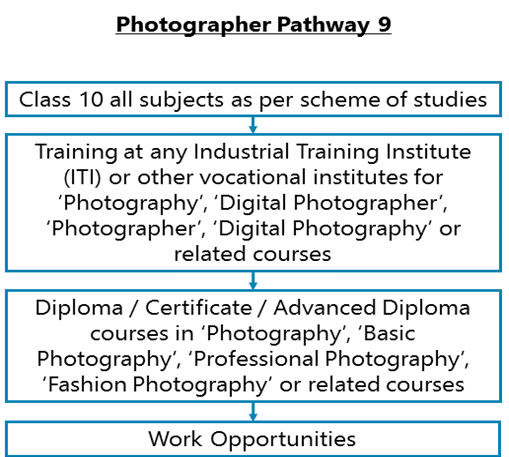
After Class 10, you can go for training at any Industrial Training Institute (ITI), National Skill Training Institute (NSTI), Regional Vocational Training Institute (RVTI), National Vocational Training Institute (NVTI), Industrial Training Center (ITC), Workshop Training Institute (WTI) or other vocational institutes for ‘Photography’, ‘Digital Photographer’, ‘Photographer’, ‘Digital Photography’ or related courses. These are 2-year courses. You will sit for All India Trade Test (AITT) to get a National Trade Certificate (NTC) after this course. This exam is held twice a year in the months of February and July. Then you can go for a Diploma / Certificate / Advanced Diploma course in ‘Photography’, ‘Basic Photography’, ‘Professional Photography’, ‘Fashion Photography’ or related courses. There are various institutes which offer these courses in distance learning mode too meaning you do not have to go to the Institute for classes other than for practical training (whenever applicable). However, there are other institutes which provide coaching in the regular mode where you have to visit the Institute for taking the classes.
Required Qualification & Competencies
After Class 5 in school, you can do an NSQF Level 3 training course for ‘Digital Camera Photographer’ or similar courses.
After Class 10 with any subjects, you can go for:
1. ITI Training courses.
2. NSQF Training courses.
3. CTS Training courses.
4. NAC Training.
5. MES Training courses
6. Class 11-12.
After Class 11-12, you can go for:
1. B. Voc. courses.
2. Diploma / Certificate / Advanced Diploma courses.
Various private/public vocational training establishments across India offer related courses on:
1. Photography
2. Photography Design
3. Digital Photographer
4. Photographer
5. Photojournalism
MINIMUM EDUCATION REQUIRED | MAXIMUM EDUCATION REQUIRED |
Under Secondary Certificate Programs for which the minimum eligibility is a pass in any class below class X. | Post Higher Secondary Diploma / Certificate Programs for which the minimum eligibility is a pass in Higher Secondary / Class XII School Leaving examination. |
Competencies Required
1. You should have an interest in Artistic Occupations. Artistic occupations mostly involve working with creative ideas, art, and designs. These occupations involve abstract or conceptual thinking, and creative self-expression and often do not follow any set processes or rules for getting things done.
2. You should have an interest in Enterprising Occupations. Enterprising occupations involve taking initiative, initiating actions, and planning to achieve goals, often business goals. These involve gathering resources and leading people to get things done. These require decision-making, risk-taking and action orientation.
3. You should have an interest in Investigative Occupations. Investigative occupations involve working with ideas and quite a lot of thinking, often abstract or conceptual thinking. These involve learning about facts and figures; involve the use of data analysis, assessment of situations, decision making and problem-solving.
4. You should know about Communications and Media - Knowledge of how different media such as print, television, radio, and social media work; how to produce content such as news, articles, audio-visual programs, etc. for different media. This includes various ways to inform and entertain people via print, audio, audio-visual and online media.
5. Originality - The ability to come up with unusual or innovative ideas about a given topic or situation, or to develop creative ways to solve a problem.
6. Fluency of Ideas - The ability to come up with several ideas about a topic (the number of ideas is important, not their quality, correctness, or creativity).
7. You are mostly impulsive in your action and behavior.
8. You are always imaginative or in most situations.
9. You act independently sometimes but do not do so in some other times.
10. You prefer to experience new things and have new experiences sometimes.
Career - Job Opportunities & Profiles
You may work independently as a Freelance Photographer or look for project opportunities as a Photographer in various enterprise such as:
1. Print media companies such as newspapers, magazines, periodical publishing houses
2. Advertising agencies
3. Book publishers
4. Websites
5. Television Companies
6. Television show producing companies
7. Agencies involved in commercial photography, wedding photography, event photography, fashion photography, etc.
8. You may also get opportunities to work with well-known photographers
In media companies, you may get roles like:
1. Photographer
2. Assistant Photographer
3. Press Photographer
Specialisation Tracks In This Career
1. Portrait Photographer
As a Portrait Photographer, you will have to cover various verticals starting from schools to weddings. You may specialize in wedding photography, newborn photography or family photography including pets. You will have to handle several other responsibilities like making appointments, billing your clients, processing and framing images/photos, etc. if you have your own business or are self-employed. You may also sell your shots/images as stock photos.
2. Commercial Photographer
As a Commercial Photographer, you will mainly be helping your clients advertise and promote their products or services. You will be photographing buildings, commercial properties, official equipment, corporate projects, merchandise, company employees, catalogs, websites, advertisements, etc. Several companies need this service for company records, reports, symposiums, annual presentations, etc. This is one of the most lucrative careers in photography. You may have to operate out of your own studio or work at a chosen location. You may specialize in real estate, sports, travel, fashion, art & lifestyle, wildlife, landscapes, food, education & training, electronics, and hardware or others. You will have to handle several other responsibilities like making appointments, billing your clients, processing and framing images/photos, etc. if you have your own business or are self-employed. You may also sell your shots/images as stock photos.
3. Scientific Photographer
As a Scientific Photographer, you need to document various subjects like experiments, technical information etc. You may have to bring images, which are not visible to the human eye, to life. You may have to use specialized instruments and techniques for infrared photography, micrography or underwater photography and others. You may be working with research facilities, government agencies, media houses or universities. You will have to handle several other responsibilities like making appointments, billing your clients, processing and framing images/photos, etc. if you have your own business or are self-employed. You may also sell your shots/images as stock photos.
4. Photojournalist
As a Photojournalist or Press Photographer, you will be capturing news stories in the form of pictures/images. You may work with major newspapers, magazines, media houses, newswires, websites, radio stations, television companies, periodical publishers or journals operating in both online and print media spaces. Your job will be to reproduce first-hand information in the form of photographs about events, facts, ideas, and people. You have to be a skilled storyteller, whether your photographs are accompanied with written text or not. Your photographs must convey the correct message to the audience. You may be on direct payroll with a media house or may also work as a freelancer. You may have to cover national/local events, court proceedings, politics, forensic studies or sports. You will have to handle several other responsibilities like making appointments, billing your clients, processing and framing images/photos, etc. if you have your own business or are self-employed. You may also sell your shots/images as stock photos.
5. Freelance Photographer
As a Freelance Photographer, you will be working out of your own studio. You can operate in just about any industry and specialize in news, events, fashion, etc. It is slightly more challenging to establish oneself as a Freelance Photographer, especially to develop and maintain industry contacts. You may cover weddings, family, pets, businesses, corporate events, restaurants, food blogs photos, etc. You may also sell your shots/images as stock photos.
Career Growth
From entry-level job positions as a Photographer, Assistant Photographer, Press Photographer, Product Photographer, Still Photographer, etc., you may grow into a senior role managing the work of a few photographers. In medium and large-scale companies, you may have a position as a Senior Photographer, or Chief Photographer after 12-15 years of experience.
Salary Offered
1. Most photographers begin as an individual and working on a project either assisting a senior photographer or working independently. They earn on a project basis. For a day’s work, a beginner may get just about Rs. 2,000.
2. Someone with a good portfolio may start getting Rs. 10,000-20,000 or even more for a day’s work. Wedding and fashion photographers may earn much more. A good photographer doing wedding photography may get Rs. 25,000-1,00,000 a day. A Fashion Photographer may get Rs. 50,000 – 2,00,000 for a day’s work. A reputed fashion photographer may take about Rs. 10,00,000 or even more for a day’s work. They make 15-20 crore a month.
3. But photography is a highly crowded and competitive field. It’s difficult to establish your presence. But nevertheless, if you are dedicated and focused, in about 5-6 years, you may make a decent Rs. 25,000-50,000 a month. After 10-12 years, you may earn much more.
4. Wildlife Photography is another very lucrative field but it takes a long time to establish yourself as an independent photographer. You have to work as an Assistant for a long time. You may make about Rs. 50,000 – 2,00,000 or more for a project which may last for a few weeks. Reputed Wildlife Photographers take about Rs. 15,00,000 – 1 crore or even more for a project, depending upon the nature of photography required and the duration of the project.
5. Photographers hardly get a permanent job except in some media companies. Here, at a junior level, one can earn about Rs. 10,000-22,000 a month. In the middle level, one can make about Rs. 20,000 – 50,000 a month. A senior photographer may make about Rs. 25,000 – 1,50,000 or even more per month.
Monthly Earning In Indian Rupee
Entry Level | Junior Level | Mid-Level | Senior Level | |||||
Min Earning | Max Earning | Min Earning | Max Earning | Min Earning | Max Earning | Min Earning | Max Earning | |
8000 | 20000 | 15000 | 35000 | 20000 | 150000 | 30000 | 1000000 | |
1. Entry level: 0 - 2 years of work experience
2. Junior Level: From 1 to 12 years of work experience
3. Mid-Level: From 5 to 20+ years of work experience
4. Senior Level: From 10 to 25+ years of work experience (there could be exceptions in some high-end technical, financial, engineering, creative, management, sports, and other careers; also in the near future, people will reach these levels much faster in many careers and in some careers, these levels will have no meaning as those careers will be completely tech skill driven such as even now, there is almost no level in a Cyber Security Expert’s job)
Work Activities
1. Getting Information and learning - Observing, hearing, reading, using computers, or otherwise obtaining information and learning from it.
2. Creative thinking - Developing new ideas, concepts, innovative solutions to problems, newer ways of getting things done, designing products and services, creating work of art and craft, etc.
3. Identifying objects, actions, and events - Identifying various characteristics of objects; observing and understanding actions and events; understanding changes in actions and events.
4. Inspecting situations, events, and people - Inspecting situations, events and people to understand the reasons and causes for the situation or events to happen; inspecting people to understand reasons behind their behavior and actions.
5. Assessing and evaluating quality- Assessing and evaluating the quality of materials, systems, processes, products, services, etc.
6. Developing and maintaining inter-personal relationships - Developing professional relationships with co-workers and others outside organisations and maintaining good relationships.
7. Communicating with co-workers and others– Communicating with people in writing, verbally or otherwise inside your workplace and various other people who have professional relationships with your place of work.
8. Presenting and demonstrating work to others – you will need to present and demonstrate your work to others such as clients, co-workers, and superiors.
9. Working in a team - Working in a multi-disciplinary team of people; developing a team; maintaining professional relationships among team members.
Future Prospects
The road ahead for this pathway looks very promising. Indian Media and Entertainment Industry has shown decent growth. The Television industry is expected to grow in terms of employment volume to 0.64 million from 0.28 million in 2017, translating to a human resource requirement of 0.36 million. The Print Media industry is expected to grow in terms of employment volume to 0.13 million from 0.07 million in 2017, translating to a human resource requirement of 0.06 million.
The overall industry growth of the Media and Entertainment Sector has been estimated at a rate of 13.10% compounded annually to touch the mark of 39.68 billion US Dollars from 22.28 billion US Dollars in 2018. India’s media consumption has been growing at a rate of 9% compounded annually. This is 9 times that in the US and 2 times that in China.
Future Prospects At A Glance
Current (0-1 year) | Long Term (2-5 year) | Very Long Term (6-10 years) |
Somewhat Negative | Slow Growth | High Growth |

